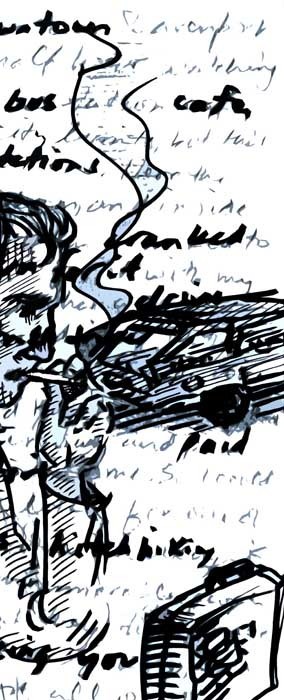Hitchhike your way to happiness
How to see the country, meet great people and mooch off them
If you’re tired of working a job, living in a city and taking showers, hitchhiking may be for you.
It is the cheapest way to travel quickly, although it remains illegal within city limits, on freeways and in most of America. Canadian cops can be pretty lenient on hitchhikers as long as they’re not creating a disturbance or pissing people off.
In a loose French translation, hitchhiking is “faire du pouce,” or “ride the thumb.” There is no English equivalent as satisfying as that mental image.
Hitchhiking is closer to a sport than a hobby. To hitchhike is to expose oneself to the world in a way that’s difficult to replicate in a city. Ever been hiking or camping? Imagine that, but on a highway. The bugs will get you, the sun will cook you and the drivers will snub you. So why do it?
Because it’s amazing, that’s why. Hitchhiking can be an opportunity to discover what freedom is. The skies are always massive while on the road.
Obviously, hitchhiking is not for everybody. The best method is to pair up with somebody of the opposite sex. Women can get the security of having a male around (this is not a sexist assertion but rather a tragic observation) and men can benefit from having a ride-attracting female companion. In either case, the road can be lonely and a partner helps.
North America was rife with hitchhikers in the 1960s and ’70s, but the sport has declined greatly.
William Thomas wrote in his book Never Hitchhike on the Road Less Traveled that hitchhiking died after the ’70s. I disagree strongly, for when I spent my time exploring Canada’s highways the hard way, I met fellow ‘hikers daily.
But it has declined. Are people not daring or poor anymore? The popularity of lottery scratch cards says no.
For one thing, people don’t trust strangers as much anymore, with good reason. There are any number of horror stories about hitchhiking, ranging from the absurd (hook-in-the-door, anyone?) to the terrifyingly real (B.C.’s “Highway of Tears” between Prince George and Prince Rupert is renowned for missing women), but the positive stories far outnumber them.
I don’t want to trivialize the danger. Hitchhiking is risky. Hardly any mother on Earth would recommend hitchhiking to her children, and the ones who would are likely drunk and/or stoned.
Risky or not, my own thumb-ridings reinforced my faith in humanity daily. It takes a supremely kind person to allow a potentially foul-smelling stranger into their vehicle. Supremely kind, or supremely bored. Either way, it’s a huge leap of faith for drivers and riders alike. I can’t count the number of amazing, interesting and generous people I’ve ridden with.
I’ve had my share of sketchy experiences too (including more than a couple drunks and one pickup truck that wanted to take my girlfriend but not me); I just tell myself that bad things can happen in a city, too.
The road can teach you things. For one, you have to learn how to be alone. It may be hours before your next ride, so you might as well get to know yourself. This can be arduous as many people are jerks and don’t realize it. The road can be your therapist, so feel free to talk things out.
The road doesn’t judge. On the way, you’ll meet complete strangers who unload their life stories on you – and it’s best to reciprocate.
A summer spent on the road can enhance your appreciation of life, the universe and everything. (Thank you, Douglas Adams.) If nothing else, it can enhance your appreciation of clean sheets.
Andrew McMonagle rode his thumb across Canada and parts of the U.S. and enjoyed every second of it.
Published in Volume 64, Number 25 of The Uniter (April 1, 2010)







